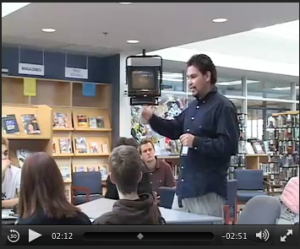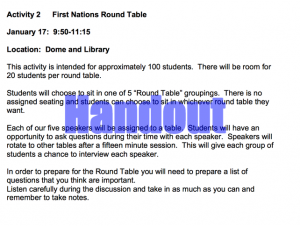Frances Kelsey Secondary developed a model to meet Learning outcome in a meaningful way for students:
demonstrate knowledge of the challenges faced by Aboriginal people in Canada during the 20th century and their responses, with reference to:
- residential schools
- reserves
- self-government
- treaty negotiations
 |
 |
The reasons why the Social Studies Department chose to host a round table discussion was to try to meet the following Learning outcome in a meaningful way for students:
demonstrate knowledge of the challenges faced by Aboriginal people in Canada during the 20th century and their responses, with reference to:
- residential schools
- reserves
- self-government
- treaty negotiations
As department head, I felt we skimmed over this topic in our learning guides and wanted to engage the students in a more interactive way. It is interesting to note that the Executive Summary on the Social Studies Curriculum (Grades 8 to 12) Needs Assessment noted that “Many students find Social Studies boring and do not see the relevance of course material in their own lives” and that “Teacher, parents and students all want Social Studies to be more interesting, relevant and engaging for students”. (BC Ministry of Education, 2007)
We wanted the onus on the students to ask questions or “interview” our guests rather than have our speakers present to the students. By doing this, we hoped the students would become active participants in the discussion rather than passive learners.
A second reason was to try to create a sense of empathy towards the plight of First Nations Peoples in Canada. We live in a bicultural community but there is little interaction and understanding between these two cultural groups. Many students are oblivious to the reserve systems, residential schools, and the Indian Act. What better way to learn this than to engage students in a meaningful discussion with First Nations Peoples?
